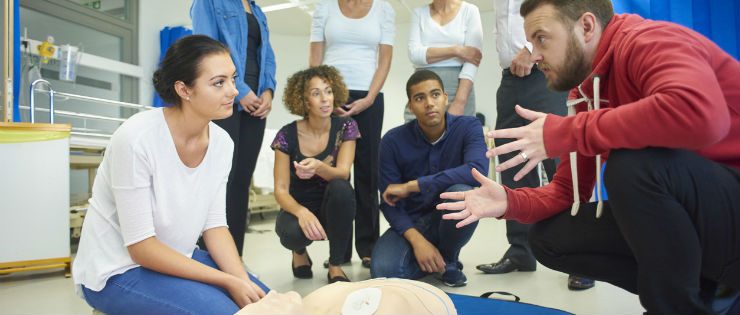
CPR Skills. It’s easy to think you will never need them if you haven’t witnessed a serious accident or injury. But it’s time to think again. One day a friend, family member, colleague or stranger may rely on you to save their life. The few short hours you spent learning the skill of CPR can be richly rewarded.
Here are four good reasons why you should learn CPR:
Time is Limited
If someone is unresponsive, they rarely have time to wait for an expert to arrive. After a cardiac arrest, irreversible brain damage occurs within four minutes. If 10 minutes lapses without any CPR, they will most likely die. Performing CPR will circulate blood to the brain and organs but every minute is valuable. Start CPR immediately to help keep someone alive until help arrives.
2. Paying it Forward
By learning CPR and telling friends and family, you might encourage another person to do the same. One day you may be the person who needs life-saving CPR, and they are there to save your life. The more people in the community with CPR skills, the greater the chance everyone has of surviving an accident or cardiac arrest.
3. Peace of Mind
Many parents of babies and young children have a constant fear of what they will do if their child is choking or drowning. No one knows how they will react in a situation where their son or daughter is in a life-threatening situation. However, with some training under your belt, you are more likely to be able to help your child in an emergency. You will also have some peace of mind that you are as prepared as you can be should the worst happen.
4. Improve your Employment Prospects
For many types of employment it’s mandatory to know CPR. In addition to medical roles, you may need CPR skills to be a police officer, teacher, child care worker, swimming instructor or security officer.
If you are looking for work in almost any field having CPR and first aid skills can give you a better chance of success. Employers value having staff with first aid skills and can help a colleague or customer at the time of an emergency. Young people looking for casual or holiday work may be able to secure a job because of their skills.
If more people learn CPR in Australia, the rate of deaths caused by cardiac arrest can be slowed. Currently, the survival rate is just 10 percent. Remember you don’t need to be an expert, just jump in and do what you can from the training you have received.
HIF Ambulance Cover
We hope you will never need to call an ambulance, but if you do you will want the fees covered. Check out HIF’s ambulance cover, Australia wide but benefits vary in each state.